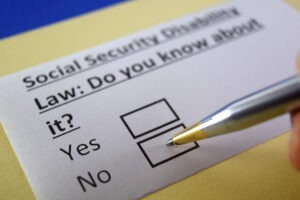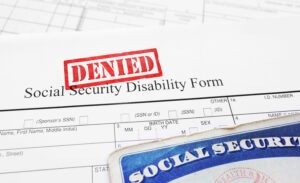The Social Security Administration’s (SSA) Blue Book lists the medical impairments that qualify for Social Security Disability Insurance (SSDI) and Supplemental Security Income (SSI). The SSA considers these impairments severe enough to prevent a disabled person from working.
Even if your impairment is not on the list, you might still qualify for disability benefits. However, recovering benefits when your disability is not on the Listing of Impairments can seem nearly impossible. The disability attorneys at Berger and Green can help.
What types of impairments are in the SSA Blue Book?
Most of the impairments listed in the SSA Blue Book are permanent impairments or ones that the SSA expects to result in death. If your impairment will only last for a shorter period of time, you may still be able to qualify for disability benefits if your disability is expected to last at least one year.
Musculoskeletal System Impairments: These impairments affect your bones, muscles, tendons, ligaments, and joints.
Cardiovascular System Impairments: These impairments affect your heart and circulatory system. Examples include chronic heart failure, pain caused by myocardial ischemia, and inadequate cardiac output.
Digestive System Impairments: Examples of digestion impairments that could qualify for disability benefits include liver dysfunction, inflammatory bowel disease, or short bowel syndrome.
Neurological Impairments: These impairments affect your brain. Examples include epilepsy, cerebral palsy, multiple sclerosis, and more.
Other Impairments: The SSA Blue Book lists many other impairments, including disorders of the kidneys, respiratory system, blood, skin, endocrine system, mind, and immune system, among others.
40+ years of experience from strong, knowledgeable, compassionate attorneys.
Start A Free EvaluationWhat if my impairment is not on the list?
Even if your impairment is not in the SSA Blue Book, you could still qualify for disability benefits. Ultimately, in order to be eligible, you must meet five criteria.
1. You Have a Limited Ability to Work
In order to be eligible for disability benefits, you must have difficulty working. If you are currently working and you earn more than $1,130 a month, the SSA will not consider you disabled.
2. Your Condition is Severe
In order for the SSA to consider your condition or impairment severe, your condition must interfere with basic work-related activities. If your condition does not affect you while at work, you will not qualify.
3. Your Condition is Similar to Those Listed in the Blue Book
The SSA will review your case and, if it determines that your condition is of “equal severity” to a Blue Book condition, you could be eligible for benefits.
4. You Are Unable to Do the Work You Did in the Past
If your condition is not as severe as a listed impairment, you could still qualify for benefits if your condition does not allow you perform the work you did previously under some conditions.
5. You Cannot Do Any Other Type of Work
If you are unable to perform your old job, the SSA will see if you can adjust to a different kind of work. The SSA will look at your age, education, past work experience, and skills to determine if you can perform another line of suitable work. If you are unable to do so, you will be eligible for disability benefits.
We know you’re hurting. We can help. Free case evaluations, home and hospital visits.
Contact Us Now For HelpContact Berger and Green for Help Filing a Disability Claim
Regardless of whether your impairment is in the SSA Blue Book, if you are unable to work due to your medical condition, you deserve disability benefits. The disability lawyers at Berger and Green can help you file a claim for benefits to get the income support that you need. Contact us today for help: 412-661-1400.











